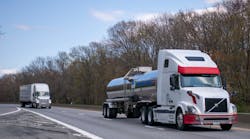The Federal Motor Carrier Safety Administration (FMCSA) has extended its pandemic-related emergency exemption for drivers assisting by another month. This is the second extension of the order, which will now last through June 14.
The exemption, which applies to truck and bus drivers assisting with COVID-19 pandemic relief, was set to expire on May 15. Originally issued on March 13 in response to the national emergency over the coronavirus pandemic, the federal order continues the exemption granted from Parts 390 through 399 of the Federal Motor Carrier Safety Regulations (FMCSRs) for all 50 states and the District of Columbia. Those regulations include rules covering hours of service, vehicle inspections and driver qualifications, among others.
“This extension of Emergency Declaration addresses national emergency conditions that create a need for immediate transportation of essential supplies, equipment and persons, and provides necessary relief from the FMCSRs for motor carriers and drivers engaged in the transport of essential supplies, equipment and persons,” according to the declaration issued by the FMCSA on May 13.
The initial FMCSA emergency declaration was issued in March after President Trump declared a national emergency in response to the COVID-19 public health emergency declared by the Health and Human Services Secretary. Because the COVID-19 national emergency is still in place, the FMCSA is extending its emergency declaration for another month.
FMCSA’s declaration classifies direct pandemic assistance as transportation and other relief services provided by a motor carrier or its drivers for the “immediate restoration of essential services (such as medical care) or essential supplies (such as food and fuel) related to COVID-19 during the emergency.”
The relief services are broken down into nine categories by the FMCSA:
- Medical supplies and equipment related to the testing, diagnosis and treatment of COVID-19
- Supplies and equipment necessary for community safety, sanitation, and prevention of community transmission of COVID-19 such as masks, gloves, hand sanitizer, soap and disinfectants
- Food, paper products and other groceries for emergency restocking of distribution centers or stores
- Immediate precursor raw materials — such as paper, plastic or alcohol — that are required and to be used for the manufacture of items in categories 1, 2 or 3
- Fuel
- Liquefied gases to be used in refrigeration or cooling systems
- Equipment, supplies and persons necessary to establish and manage temporary housing, quarantine, and isolation facilities related to COVID-19
- Persons designated by federal, state or local authorities for medical, isolation, or quarantine purposes
- Persons necessary to provide other medical or emergency services, the supply of which may be affected by the COVID-19 response.
“Direct assistance does not include routine commercial deliveries, including mixed loads with a nominal quantity of qualifying emergency relief added to obtain the benefits of this emergency declaration,” according to the declaration.
The FMCSA declaration also notes that drivers and carriers providing direct assistance during the pandemic must still comply with other federal and local laws and regulations, specifically in these seven categories:
- Commercial motor vehicles must be operated in accordance with state laws and regulations, including compliance with applicable speed limits and other traffic restrictions.
- No operation of a commercial motor vehicle while a driver's ability or alertness is impaired — or so likely to become impaired — through fatigue, illness, or any other cause, as to make it unsafe for him/her to begin or continue to operate the motor vehicle.
- Motor carriers shall not require or allow fatigued drivers to operate a commercial motor vehicle. A driver who informs a carrier that he/she needs immediate rest shall be given at least ten consecutive hours before the driver is required to return to service.
- A motor carrier whose driver is involved in a crash while operating under this emergency declaration must report any recordable crash within 24 hours, by phone or in writing, to the FMCSA Division Office where the motor carrier is domiciled. The carrier must report the date, time, location, driver, vehicle identification, and brief description of the crash.
- Nothing in this emergency declaration shall be construed as an exemption from the controlled substance and alcohol uses and testing requirement, the commercial driver’s license requirements, the financial responsibility (insurance) requirements, the hazardous material regulations, applicable size and weight requirements, or any other portion of the regulations not specifically exempted under 49 CFR § 390.23.
- Motor carriers or drivers currently subject to an out-of-service order are not eligible for the relief granted by this declaration until they have met the applicable conditions for its rescission and the order has been rescinded by FMCSA in writing.
- Direct assistance terminates when a driver or commercial motor vehicle is used in interstate commerce to transport cargo or provide services that are not in support of emergency relief efforts related to COVID-19 or when the motor carrier dispatches a driver or commercial motor vehicle to another location to begin operations in commerce. Upon termination of direct assistance to emergency relief efforts related to COVID-19, the motor carrier and driver are subject to the requirements of 49 CFR Parts 390 through 399, except that a driver may return empty to the motor carrier’s terminal or the driver’s normal work reporting location without complying with Parts 390 through 399. When a driver is moving from emergency relief efforts to normal operations a 10-hour break is required when the total time a driver operates conducting emergency relief efforts, or a combination of emergency relief and normal operations, equals 14 hours.




